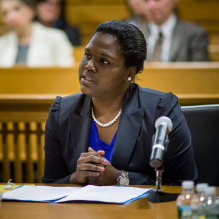Kerisha Hawthorne’s Testimony

I extend sincere appreciation to Chief Judge Lippman and the members of the hearing panel for conducting these hearings to discuss unmet civil legal needs. My name is Kerisha Hawthorne, and it is an honor to have this important hearing at our law school, where I am a proud member of the student body and an active participant in serving those in need. Today, I want to share with you my experiences advocating for low-income individuals through the Law School clinical program and my thoughts on the bar admissions requirement of 50 hours’ pro bono service.
Before I delve into my experiences advocating for low-income individuals through the Law School clinical program, I would like to give you some background. I came to law school wanting to bridge the gap between the legal system and low-income individuals. Growing up in a low-income community, I did not know much about the legal system or the legal profession until I entered college at SUNY Geneseo. In fact, it was this lack of knowledge about the profession that stirred my desire to enter the legal field. Throughout college I was very involved in various service opportunities and spent my summer before law school working with the New York State Division of Human Rights. So, going into law school, I knew that a career in public-interest law would be a good fit for me because I enjoyed advocating for disadvantaged individuals, and I wanted to make the legal system more accessible to people coming from similar communities as me.
However, as I made my way through my first year of law school I began losing sight of that goal. I got caught up in the first-year frenzy of wanting a large-firm career. The flurry of on-campus interviews and networking events with large firms, and the pressures of paying back my loans, made large firms with a large paycheck appealing. And in fact, the summer after my first year I did end up in a large firm. It was a great experience but a part of me knew it wasn’t the right fit.
In my second year, I participated in the Healthy Homes Legal Practicum through our law school’s Clinical Legal Education Program, and it was this experience that reminded me why I came to law school. It reminded me that I wanted to use my degree to advocate for disadvantaged individuals, specifically low-income communities. The Healthy Homes Legal Practicum is a four-credit course with a service learning field placement designed to give students the opportunity to advocate for Buffalo residents who are most impacted by unhealthy housing. In addition to educating me about various housing hazards and the importance of environmental justice, the practicum gave me the opportunity to advocate for low-income individuals through my field service hours at the Neighborhood Legal Services. At Neighborhood Legal Services, I worked with clients facing various housing hazards such as lead paint chips, mold, rat infestation, lack of heat and more. I conducted client interviews, provided referrals and drafted legal documents for clients with no other access to legal help.
My experience at Neighborhood Legal Services and in the Healthy Homes Legal Practicum gave me an opportunity to make a difference while in law school. I was able to get out of the classroom and do real-world work. I was able to be a part of something that was bigger than me and my desire to get a law school diploma. This opportunity has truly enhanced my law school experience and allowed me to use my legal education in a meaningful way.
Through the Healthy Homes Legal Practicum, I was able to complete my 50 hours’ pro bono requirement. The 50 hours’ pro bono requirement is a great initiative to encourage service among law students and to provide legal assistance to low-income individuals. In law school, it’s very easy to forget the people in our community who depend on public interest attorneys and pro bono work to have their legal needs met. However, initiatives like the 50 hours’ pro bono requirement and the Law School’s Clinical Legal Education Program are great ways to service communities in need and encourage pro bono work among law students.
One truism guides much of life, and it’s actually a philosophy of mine: “To whom much is given, much is expected.” This committee and its work have my utmost respect. I thank you for holding these hearings and working to increase access to justice for disadvantaged individuals.